The word strange is barely adequate for some of the ancient leaders described here, if the tales told of them are true. The ancient world had no shortage of outright butchers who practiced patricide, matricide, fratricide, and mass murders to consolidate and secure their positions at the head of their societies. They used brutal, though inventive methods to kill their perceived enemies and rivals, and exhibited a lust for blood and inflicting pain. Some of them appear on this list, including Commodus and Caligula.
Others exhibited downright weird behavior, on their own and at the expense of others for their personal satisfaction and comfort. Alcohol was a common denominator for some, with excessive consumption of wine and other beverages featured. The pursuit of sexual satisfaction is another. Vanity to the point of narcissism is still another. Some though, were just plainly bizarre, in their beliefs, their activities, and their behaviors. Here are 10 of the strangest.
10. Pharaoh Pepi II used honey covered slaves as walking flytraps

Pepi II was a pharaoh of the Sixth Dynasty, reigning more than 2,000 years before the Common Era. He became pharaoh at the age of 6, following the death of Merenre I. Throughout his reign the power of the pharaoh declined; the dynastic Old Kingdom, also known as the Age of the Pyramid Builders, collapsed within decades of his death, after lasting five centuries. While still a child, Pepi sent an expedition to Nubia to trade ivory and other goods. When the leader of the expedition, Harkhuf, one of his governors, informed the young King he had captured a pygmy, the excited young man promised substantial rewards should the prisoner arrive at his court alive. The pharaoh wanted it as a plaything. The letter to Harkhuf survives, inscribed on the governor’s tomb.
Using a pygmy as a toy is strange enough, but not the only strange behavior attributed to Pepi II. The pharaoh detested flies. Using slaves to wave fans of feathers to shoo them away was not enough, in his estimation. Aware that flies were attracted to honey, Pepi covered slaves with the substance, and stationed them around him when he was at court and when walking or riding through his dominions. Flies swarmed to the honey-swathed slaves, and thus away from him. Some claim Pepi II held the longest reign of any ruler in human history, though that is debated among Egyptologists. His pyramid lies in ruins in Saqqara.
9. Caligula named a horse as a priest of Rome
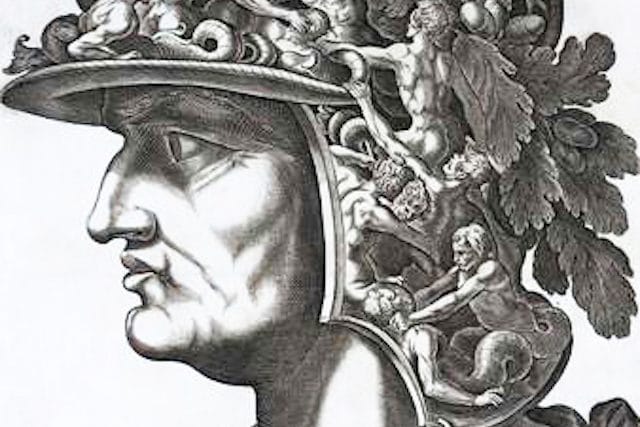
The name of the third man to hold the title of Emperor of Rome is synonymous with corruption, cruelty, brutality, sadism, and unbridled sexual indulgence and depredation. His reign as Emperor was short, as was his life, dying through assassination at the age of 28. He held the throne from 37 – 41 AD. According to most scholars, the first few months of his reign were promising, though he soon embarked on a pattern of indulging his every whim, building luxurious residences for himself. An illness during the first year of his reign – some say poisoning – transformed his personality and his attitude towards his subjects and his perceived enemies.
Several ancient historians claimed Caligula falsely accused wealthy subjects of crimes, had them executed without benefit of trial, and claimed their estates. He claimed divinity, and frequently dressed in the costumes of several Roman gods, including Mercury, Apollo, and Venus. He had the heads of various gods removed from statues throughout the empire, and replaced them with likenesses of his own. Roman historians Suetonius and Cassius Dio claimed the emperor planned to name his favorite horse, Incitatus, a consul of Rome. He did not. Instead, he appointed the horse as a priest of Rome.
8. Emperor Zhou Xin of China created a lake of wine, and swam in it

Zhou Xin is a pejorative name given to Di Xin, following his death in 1046 BCE. The records of his life and reign were deliberately falsified and exaggerated by succeeding dynasties, according to most scholars, and separating fact from fiction regarding his extravagances is difficult. During his reign he abandoned any concept of morality, hosted massive orgies, and indulged heavily in his favorite beverage, wine. He was completely enamored with wine. To the point he created a lake filled with wine, surrounded by a forest of meat trees. Constructed on the palace grounds, the lake accommodated several boats.
The meat trees surrounding the lake were real trees, from which cooked meat suspended from the branches. Zhou Xin used the lake for canoeing, bathing, consorting with his concubines, and of course, drinking. Following his defeat at the hands of King Wu of Zhou, he retreated to a pavilion at the lake, with his jewelry and other symbols of his wealth, and had it set afire, killing himself in the flames. His death marked the end of the Shang dynasty in China, and introduced the Zhou Dynasty. Recent excavations confirm the existence of the lake, and nearby water wells established the lake was not built as a water reservoir as some argued, legitimizing the tales of the lake of wine.
7. Chinese Emperor Wu used goats to decide which of his more than 5,000 concubines he should visit
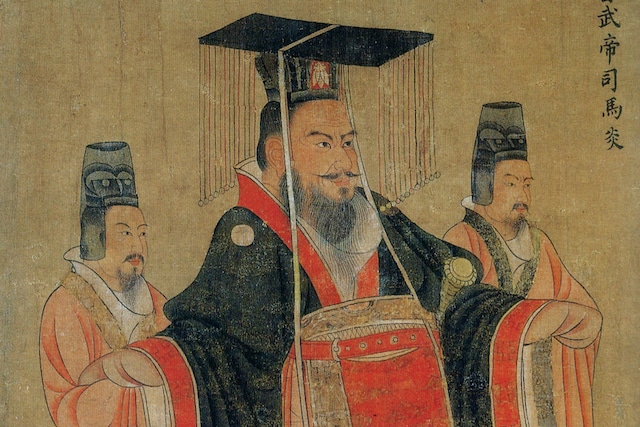
Emperor Wu of Jin was the first emperor of the Jin Dynasty, reigning from 266 to 290, CE. In 280 he defeated the forces of Eastern Wu, and became emperor of a unified China. The conquest of Eastern Wu increased his domains, his prestige, his personal wealth, and most importantly to him, the number of his concubines. Beginning in 273 he banned marriages until he had personally examined women, and either taken them for his own or rejected them. The conquest of Eastern Wu awarded him another 5,000 concubines from the palaces of his defeated enemies. From that point Wu focused his energies on gluttony, drinking, and visiting his concubines.
Decisive in battle, Wu was the opposite when selecting which concubine, or concubines, to visit. Or maybe the sheer number of women at his disposal intimidated him when it became time to choose. So, he left the decision to goats. He had a small cart fashioned, pulled by goats. He rode in the cart, and wherever the goats stopped when wandering the palace grounds occupied by the concubines, the lustful Emperor in tow, he went in. Some claim women desirous of the Emperor’s attentions placed bamboo and salt outside their rooms to entice the goats to stop. Wu died in 290 of an unknown illness, which one may surmise was exhaustion.
6. Byzantine Emperor Justin II liked to bite his courtiers and visitors
:max_bytes(150000):strip_icc()/justin2coin-58b9731f3df78c353cdc4195.jpg)
Justin II held the throne of the Eastern Roman Empire from 565 until he abdicated in 574, four years before his death. In 572 he exhibited growing signs of insanity, or at the least, strange behavior. John of Ephesus, a leader of the Syriac Orthodox Church and an historian, left written accounts of the Emperor’s increasingly strange actions in the last years of his reign. He demanded organ music played in his presence around the clock. Those who approached the Emperor found him likely to bite them. Not just a nip. Justin bit and held the bite, snarling like a wild animal, sometimes biting several times. At others he bit and chewed, organ music swirling in the background.
Which of his courtiers came up with the idea of amusing and distracting the biting Emperor with a wheeled throne is unreported. John of Ephesus recorded the Emperor’s chair had wheels installed, and Justin delighted in being rolled about in his chair. It often served to distract him sufficiently that he forgot to bite visitors or servants. In 574 he accepted the suggestion of his wife, Sophia and adopted Tiberius, a general, as his son and his designated heir, and abdicated the Byzantine throne. Sophia and Tiberius ruled as regents until Justin’s death, when Tiberius ascended to the throne as Tiberius II Constantine.
5. Korean Prince Sado required a presentation of 30 outfits to choose from before dressing
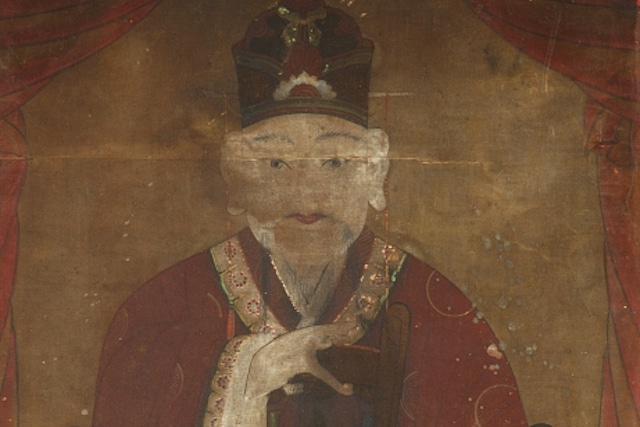
Prince Sado, the second son of Korean King Yeongjo, never served as the leader of his people, though he became the presumed heir to the throne following the death of his elder half-brother. Sado was not an ancient either, being born in 1735 CE, but in a pre-modern society and culture. Sado’s palace included eunuchs, concubines, and ladies-in-waiting, the latter of whom he frequently beat and raped. He once beheaded one of the eunuchs and carried the head to his wife and her ladies-in-waiting, forcing them to look at it as he held it in his bloodied hands.
Whenever His Highness desired to dress, which was several times per day as the mood struck him, servants were forced to display up to 30 different sets of clothing from which he chose. Those which displeased him he often burnt. He reported seeing ghosts in the palace, and outfits which he believed would upset the ghosts were similarly burnt. Servants required to dress him trembled as they did so, fearful of an act which would anger the prince and lead to their punishment, or even death. In 1762 his father had enough of his bizarre and violent son, and had him executed by placing him in a rice chest until he died.
4. Chinese Emperor Zhou Houshao had an invisible friend as an alter-ego
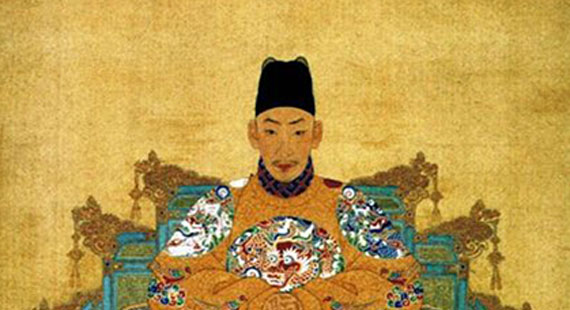
Born Zhou Houshao, he ascended to the throne as Emperor Zhengde at the age of 14. Zhengde meant “rectification of virtue.” When applied to his reign the term is very much a misnomer. The eleventh Emperor of the Ming Dynasty, his reign ended when he contracted an illness after falling into the Yellow River. Some say it was the Grand Canal. He was drunk, a common occurrence during his reign. During the fifteen years he held the throne he preferred the company of his eunuchs. He expressed interest in work only when preparing actions against those who displeased him, including against his own adoptive son, whom he had jailed. He was later executed.
To entertain himself, the Zhengde Emperor invented invisible friends, and his own fictional alter-ego, which he forced his ministers to accept. He spent much of his time playing outside of the palace, frustrating his ministers and advisors. He preferred the company of Muslim men and women in his sexual trysts as an adult, and enjoyed a luxurious lifestyle. His banning the slaughter of pigs and preference for Muslim company led to speculation that he converted to Islam, though he did not adopt that religion’s views on the consumption of alcohol. Throughout his life he continued to act like a child, with imaginary friends, and a penchant for playing childish games.
3. Herod the Great kept his wife’s body preserved in honey
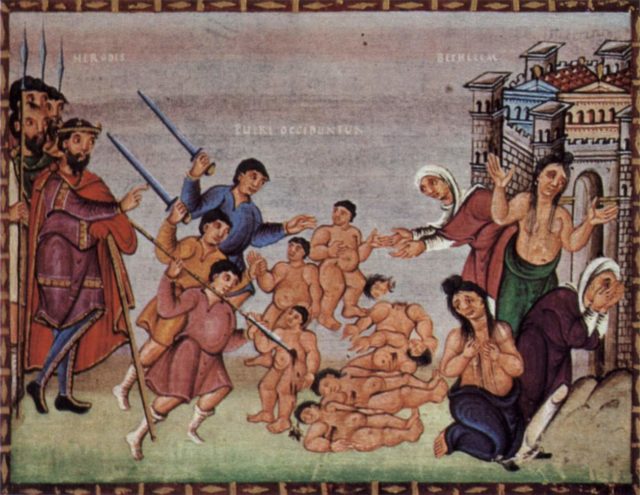
King Herod the Great achieved infamy in the New Testament, after the visitation of the Magi informed him of the birth of a Jewish King. Most of the details of his life appear in The Antiquities of the Jews, by the historian Josephus. His reign as King of Judea as a client of Rome is debated due to differences in religious sources and those of historians. It is known that Herod executed numerous members of his immediate family during his reign, including his wife Mariamne I. Even that event is disputed, the Talmud claims she committed suicide, while Josephus reports her execution after trial in 29 BCE.
The Talmud is also the source of the story of Herod’s expansive grief over the death of his wife, and that he ordered her body preserved by placing it in a casket filled with honey. The Talmud refers to the implied saving of the body for sexual gratification one of the “deeds of Herod.” Josephus is silent on the honey story, and recounts Herod tried to overcome his grief through manly pursuits such as hunting, and through feasting and drinking copiously.
2. Commodus declared himself the reincarnation of Hercules
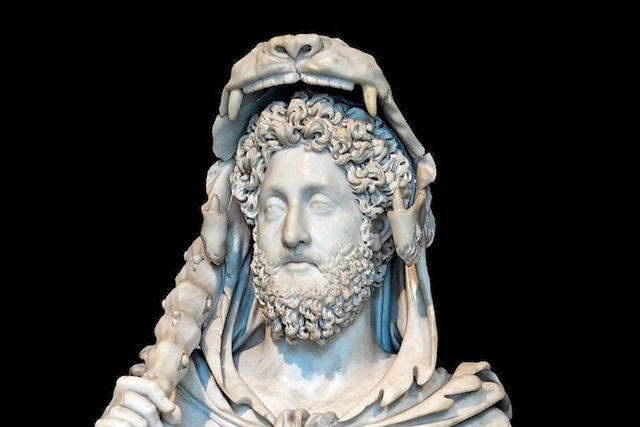
Commodus became one of the better-known Roman Emperors through the release of the film Gladiator in 2000. Joaquin Phoenix portrayed the corrupt and amoral son of Emperor Marcus Aurelius memorably, though in truth the real Commodus makes the fictional depiction an Eagle Scout in comparison. Commodus served as co-Emperor with his father for three years, became sole Emperor when Aurelius died in 180 CE, and reigned for another 12 years. Throughout his reign, his government became more chaotic. He suspected everyone, fought in the arena with “gladiators” who were in fact partially disabled men, their disabilities disguised, and did the same with wild beasts.
He had statues placed around the empire depicting him in the guise of Hercules, and later announced he was the reincarnation of the Roman god. His claim to be Hercules allowed him to claim direct descent from Jupiter, the head of the Roman hierarchy of gods. As a god he claimed immortality, a fact proved untrue when his wrestling partner, Narcissus, strangled him to death in his bath, at the behest of conspirators which included his mistress, Marcia. Following his death, the statues of the god-Emperor across the empire were destroyed.
1. Mithridates VI took poison daily to build up tolerance against assassination attempts
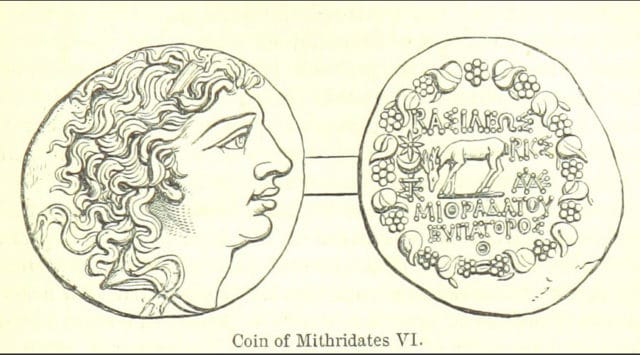
Mithridates VI of Pontus ruled Pontus and Armenia Minor as King from sometime in the second century BCE until 63 BCE. His father Mithridates V, was murdered via poison during a banquet. The death of his father gave the son a lifelong fear of suffering the same fate. Mithridates, at some point in his youth, began to immunize himself from poisons by taking them, in increasing doses. He did so while in hiding in the years immediately following the death of his father. During the time in hiding his mother, Laodice, and his brother, Chrestus, ruled the kingdom. When Mithridates returned he overthrew his mother and brother, assumed the throne, and had both imprisoned, where they died (some say executed). He gave them both royal funerals, after which he married his sixteen year-old sister, also named Laodice.
The Mithridatic Wars against the Romans and their puppet states did not go well for the king for whom they were named. After his final defeat at the hands of the Romans under Pompey, Mithridates fled to the region of the Black Sea, at first hoping to raise another army and continue the war. When the local populace rebelled against him, he opted for suicide over capture and execution by Pompey. He tried to kill himself with poison, but his efforts to build up a tolerance for poisons had been too successful. The poison didn’t kill him. Nor could be bring himself to use a sword to end his own life. It took some of his followers to kill him with swords and spears. Pompey had him buried in his ancestral grounds.